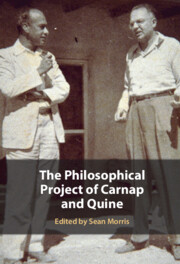Book contents
- The Philosophical Project of Carnap and Quine
- The Philosophical Project of Carnap and Quine
- Copyright page
- Dedication
- Contents
- Contributors
- Acknowledgments
- Introduction
- Part I Carnap, Quine, and Logical Empiricism
- Part II Carnap, Quine, and American Pragmatism
- Part III Carnap and Quine on Logic, Language, and Translation
- Chapter 7 Reading Quine’s Claim that Carnap’s Term “Semantical Rule” Is Meaningless
- Chapter 8 What Does Translation Translate? Quine, Carnap, and the Emergence of Indeterminacy
- Chapter 9 Quine and Wittgenstein on the Indeterminacy of Translation
- Chapter 10 Turning Point
- Part IV Carnap and Quine on Ontology and Metaphysics
- Bibliography
- Index
Chapter 10 - Turning Point
Quine’s Indeterminacy of Translation at Middle Age
from Part III - Carnap and Quine on Logic, Language, and Translation
Published online by Cambridge University Press: 18 February 2023
- The Philosophical Project of Carnap and Quine
- The Philosophical Project of Carnap and Quine
- Copyright page
- Dedication
- Contents
- Contributors
- Acknowledgments
- Introduction
- Part I Carnap, Quine, and Logical Empiricism
- Part II Carnap, Quine, and American Pragmatism
- Part III Carnap and Quine on Logic, Language, and Translation
- Chapter 7 Reading Quine’s Claim that Carnap’s Term “Semantical Rule” Is Meaningless
- Chapter 8 What Does Translation Translate? Quine, Carnap, and the Emergence of Indeterminacy
- Chapter 9 Quine and Wittgenstein on the Indeterminacy of Translation
- Chapter 10 Turning Point
- Part IV Carnap and Quine on Ontology and Metaphysics
- Bibliography
- Index
Summary
The arguments for the indeterminacy of Translation in Quine’s Word and Object (1960) form a turning point in his thinking. Quine may have started out as a disciple of Carnap’s, but in the 1940s and 1950s the most salient feature of Quine’s work is a deep asymmetry. Such extensional notions as reference and ontology are central and fully intelligible. Intensional notions such as analyticity and synonymy are not intelligible, and epistemic concerns are, in his published writing, not central. The arguments for the indeterminacy of translation undermine the asymmetry and initiate changes to the role of ontology and reference, to the status of simplicity, to Quine’s understanding of analyticity and synonymy, and to the character and centrality of his epistemology, ultimately including even a return to a two-tier epistemology. The changes do not amount to a wholesale rejection of earlier views, but exist uneasily alongside those previous views. In the aggregate, however, the changes were significant and brought Quine’s position back much closer to Carnap’s.
Keywords
- Type
- Chapter
- Information
- The Philosophical Project of Carnap and Quine , pp. 194 - 212Publisher: Cambridge University PressPrint publication year: 2023

